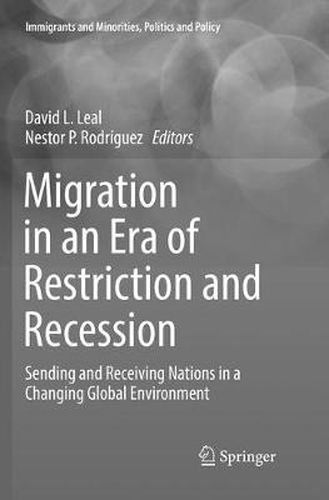Readings Newsletter
Become a Readings Member to make your shopping experience even easier.
Sign in or sign up for free!
You’re not far away from qualifying for FREE standard shipping within Australia
You’ve qualified for FREE standard shipping within Australia
The cart is loading…






This title is printed to order. This book may have been self-published. If so, we cannot guarantee the quality of the content. In the main most books will have gone through the editing process however some may not. We therefore suggest that you be aware of this before ordering this book. If in doubt check either the author or publisher’s details as we are unable to accept any returns unless they are faulty. Please contact us if you have any questions.
We live in an age of global migration. The number of immigrants worldwide is large and growing. At the same time, public and political reactions against immigrants have grown in the US, the UK, Canada, and other traditional and non-traditional receiving nations. In response to this trend, this book assembles an interdisciplinary group of scholars to better understand two dimensions of contemporary immigration policy - a growing enforcement and restriction regime in receiving nations, and the subsequent effects on sending nations. It begins with three background chapters on immigration politics and policies in the United States, Europe, and Mexico. This is followed by eleven chapters about specific receiving and sending nations - four for the United States, three for Europe, and four for the sending nations of Mexico, Turkey, Peru, and Poland. This selection of cases and the multidisciplinary approach provides a unique perspective that supplements more standard case studies and disciplinary research. By discussing a greater range of nations and topics-the global consequences of increased deportations, stronger border security, greater travel restrictions, stagnant economies, and the loss of remittances-this volume fills a significant gap in the current body of literature. As such, this book is of interest to immigration policy scholars and students of all levels as well as individuals in think tanks, advocacy communities, the media, and governments.
$9.00 standard shipping within Australia
FREE standard shipping within Australia for orders over $100.00
Express & International shipping calculated at checkout
This title is printed to order. This book may have been self-published. If so, we cannot guarantee the quality of the content. In the main most books will have gone through the editing process however some may not. We therefore suggest that you be aware of this before ordering this book. If in doubt check either the author or publisher’s details as we are unable to accept any returns unless they are faulty. Please contact us if you have any questions.
We live in an age of global migration. The number of immigrants worldwide is large and growing. At the same time, public and political reactions against immigrants have grown in the US, the UK, Canada, and other traditional and non-traditional receiving nations. In response to this trend, this book assembles an interdisciplinary group of scholars to better understand two dimensions of contemporary immigration policy - a growing enforcement and restriction regime in receiving nations, and the subsequent effects on sending nations. It begins with three background chapters on immigration politics and policies in the United States, Europe, and Mexico. This is followed by eleven chapters about specific receiving and sending nations - four for the United States, three for Europe, and four for the sending nations of Mexico, Turkey, Peru, and Poland. This selection of cases and the multidisciplinary approach provides a unique perspective that supplements more standard case studies and disciplinary research. By discussing a greater range of nations and topics-the global consequences of increased deportations, stronger border security, greater travel restrictions, stagnant economies, and the loss of remittances-this volume fills a significant gap in the current body of literature. As such, this book is of interest to immigration policy scholars and students of all levels as well as individuals in think tanks, advocacy communities, the media, and governments.